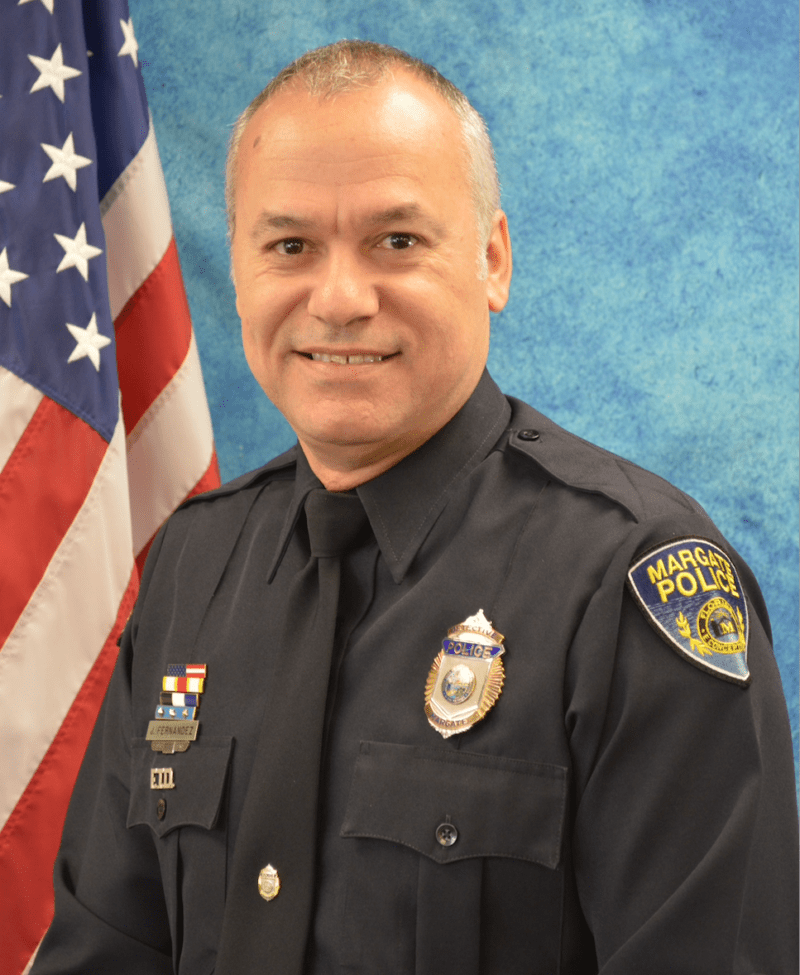
Terrill Girard and Peggy Domingue. {Margate PD}
By Kevin Deutsch
Julio Fernandez refused to give up.
The veteran Margate Police detective officially closed out a batch of hard-to-crack cold cases recently, bringing closure to grieving families and rape victims who had sought answers for decades.
Fernandez did it the old-fashioned way, using dogged investigative work and physical evidence to turn stale leads into solved mysteries.
Eight cold cases were cleared by his work: seven in Broward County and one in Miami-Dade County, where authorities had found one of the missing women’s vehicles abandoned in the Everglades.
“For me, it’s very simple…it’s about the victims,” said Fernandez, who began working Margate cold cases part-time in 2015 and full-time in 2017. “I know the pain and suffering families have to go through.”
Fernandez, a police officer for 21 years and counting, served in the U.S. Marine Corps for four years, worked in the aerospace industry for 13 years, and became a detective in 2005.
Before investigating cold cases, Fernandez worked on everything from sex crimes to homicides.
“It was always about the families,” he said of the cold cases. “That’s what drove me not to give up.”
Two of the cold cases involved missing mothers from Margate. One of the women, Terrill Girard, 39, went to pick up her two daughters from school on January 3, 2002, and was never heard from again.
She had vanished into the Everglades on one of the coldest South Florida nights in decades when the temperature fell to 32 degrees.
Girard was despondent. She had lost her 19-year-old son in a motorcycle crash a year earlier. She had recently been fired, too.
After probably drinking alcohol, Girard crashed her vehicle, Fernandez said. Then she walked into the Everglades and died in the water.
Fernandez said that her bones were found by people riding airboats in 2004, about 300 yards from where her vehicle had been found.
Fourteen years later, in 2018, Fernandez sensed the remains in the Everglades could be Girard’s.
But familial DNA testing—a developing technology at the time—had never been performed in the case.
Margate Police had evidence that made such testing possible: a DNA sample submitted by Girard’s daughter in 2008.
That was the same year Fernandez began work on Girard’s case, years before taking it on again as a cold case detective.
In 2018, Girard’s daughter’s DNA was uploaded into NamUs, the National Missing and Unidentified Persons System.
Detectives got a match for the Everglades remains, and the Girard mystery was solved.
Fernandez flew to Selma, Alabama, to deliver the news to Girard’s family in person.

Det. Julio Fernandez [Margate Police]
He also solved the baffling disappearance of another Margate woman, 41-year-old Peggy Domingue.
On July 5, 1985, one of Domingue’s two sons came home to where Domingue lived with her boys and 9-year-old daughter, only to find her missing.
“Like [Girard], she disappeared off the face of the earth,” said Fernandez.
Seven years later, in 1992, skeletal remains were found near the waters off of Northwest 11th St. in Margate, a quarter of a mile from where Domingue lived. The weather was dry at the time, with a lack of rain leaving water levels extremely low.
A group of local kids were playing in a drainage tunnel, searching for turtles, when they came upon a human skull, femur, and other skeletal remains.
Years later, as in the Girard case, Fernandez sifted through old leads and stacks of handwritten notes left by his predecessors. He called Domingue’s daughter, who was nine when her mother vanished, to ask for a DNA sample.
The daughter agreed and gave the genetic evidence to the police.
When Fernandez submitted the evidence to NamUs, the DNA matched the remains found by the children in Margate.
Another case had been solved. But Fernandez wasn’t finished.
In a separate cold case investigation, the detective identified and helped capture a serial rapist who brutalized a series of women inside their Margate and Tamarac homes in the 1990s before escaping to Jamaica.
“I wanted to know everything about him,” Fernandez said of the rapist.
Russell McLean, 65, was arrested in June and extradited to Broward County from Jamaica in July.
He is charged with multiple counts of armed sexual assault, armed kidnapping, burglary, and other crimes stemming from the series of attacks that terrorized Margate and Tamarac residents in 1996 and 1997.
McLean raped two of the women at gunpoint in the same Margate home on June 12, 1996, police said.
About a month later, the armed McLean attacked a woman in the same neighborhood, binding her hands in her bedroom and threatening to kill her until she fought him off, causing him to flee her home, records show.
He raped a fourth victim in Tamarac on April 26, 1997, leaving behind DNA evidence that police later matched to DNA collected from the Margate rape victims’ bodies, according to Margate Police.
Records filed by police show McLean carefully stalked his victims and broke into their homes when they were most vulnerable.
McLean struck again on January 27, 1997, breaking into a Coral Springs home, police said. Records show that this time, the woman he was targeting called the police in time, and McLean was arrested for the break-in.
Police found a toy gun, knife, gloves, and a flashlight in his possession. But his DNA had not yet been matched to the rape victims, and he was not then suspected of any sexual assaults.
McLean soon bonded out of jail and fled to Jamaica despite surrendering his passport.
“There was no closure, no justice for them,” Fernandez said of the rape victims.
The detective followed up on old leads in the rape cases and developed new ones.
The evidence pointed to McLean as the attacker, but Fernandez knew he needed DNA to prove his case.
With fellow detectives, he said he got a voluntary DNA sample from McLean’s sister in Atlanta.
Again, using genetic testing, the sister’s DNA was compared with rape kit evidence, which confirmed the presence of McLean’s DNA.
For the women whose lives McLean devastated through violence, justice had finally arrived.
Other cold cases remain open in Margate, including several homicides, one of which happened in 1974.
Suspects have been developed in some of the crimes, but physical evidence is needed to arrest them for the acts, Fernandez said.
These days, the cold case expert advises Margate detectives on various cases and techniques, using his hard-won experience to improve public safety.
When Fernandez considers what drove him to keep working the cold cases, despite long odds and countless obstacles, he recalls a letter one of the missing woman’s relatives sent him.
“Please don’t give up looking for her,” the letter said.
“That’s what kept me going,” said Fernandez.
Got News? Send it to Margate Talk. Don’t miss reading Coral Springs Talk, Parkland Talk, and Tamarac Talk.
Author Profile

Latest entries
 NewsDecember 29, 2025Snapshot of Resident’s Backyard Sunset Named Margate’s Photo of the Year
NewsDecember 29, 2025Snapshot of Resident’s Backyard Sunset Named Margate’s Photo of the Year NewsDecember 29, 2025Missing Man Found Dead in Margate Lake
NewsDecember 29, 2025Missing Man Found Dead in Margate Lake Crime and SafetyDecember 12, 2025Suspect Identified After BSO Deputy Shot, Saved by Vest in Margate
Crime and SafetyDecember 12, 2025Suspect Identified After BSO Deputy Shot, Saved by Vest in Margate Crime and SafetyDecember 11, 2025Margate Shooting: BSO Deputy Shot But Protected by Vest, Suspect Also Wounded
Crime and SafetyDecember 11, 2025Margate Shooting: BSO Deputy Shot But Protected by Vest, Suspect Also Wounded











